The 9th Cross-Strait Korean Studies Graduate Student Forum Successfully Held
On June 21, 2025, the 9th Cross-Strait Korean Studies Graduate Student Forum was successfully convened in the Second Meeting Room on the 7th floor of the Administration Building at National Chengchi University (Taiwan). The forum brought together over thirty experts, scholars, and graduate students from Peking University, National Chengchi University, Shandong University, Nanjing University, and Chinese Culture University (Taiwan). The Cross-Strait Korean Studies Graduate Student Forum was jointly initiated in 2014 by the Department of Korean Language and Culture, School of Foreign Languages, Peking University; the Korean College of Shandong University; and the Department of Korean Language and Literature, College of Foreign Languages & Literature, National Chengchi University. The Department of Korean Language and Literature, School of Foreign Studies, Nanjing University joined the initiative in 2017. With the participation this year of the Department of Korean Language and Literature, College of International Studies and Foreign Languages, Chinese Culture University (Taiwan), the forum has now expanded into a collaboration among five universities.
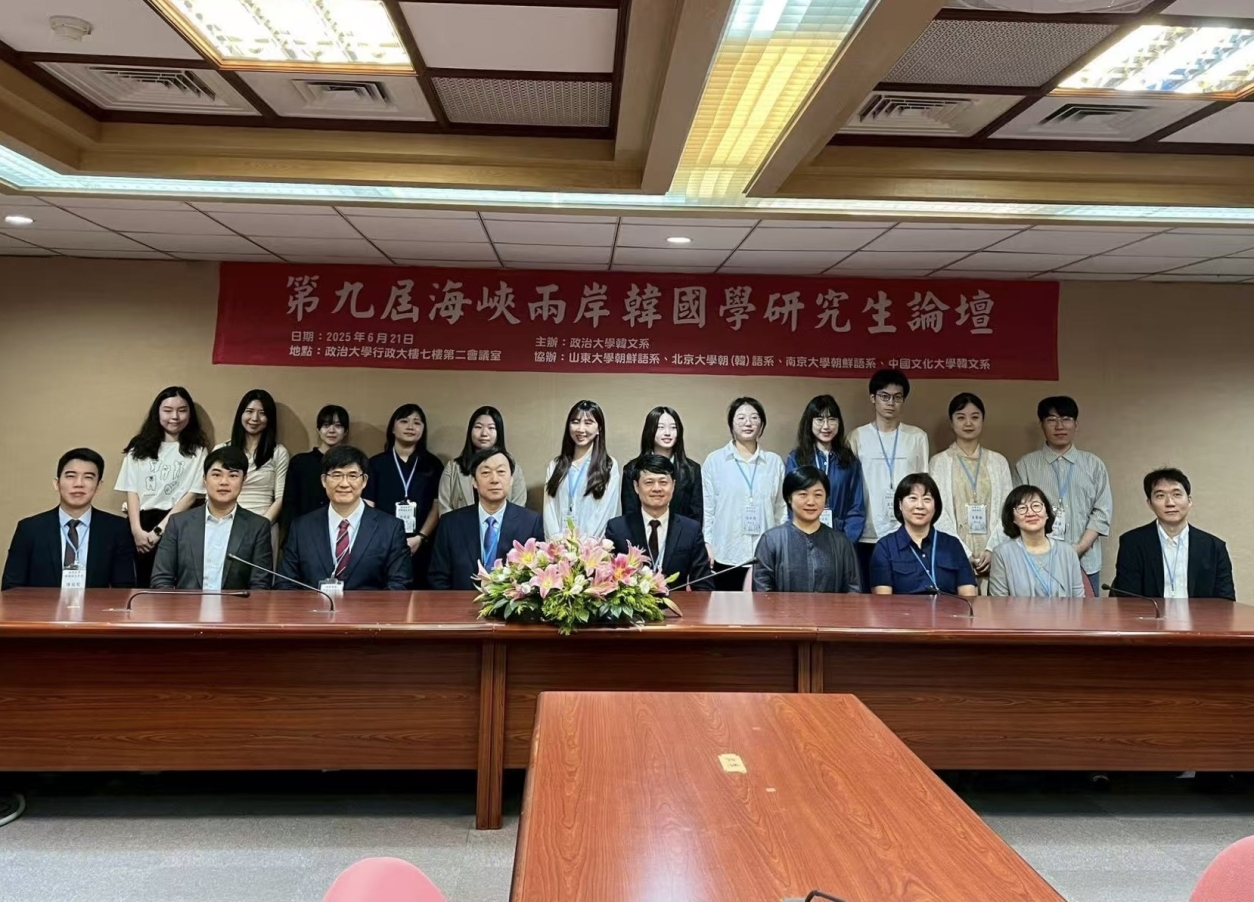
The forum comprised six segments: an opening ceremony, four thematic presentation sessions, and a closing ceremony. The opening ceremony was presided over by Professor Chen Guan-Chao from the Department of Korean Language and Literature at National Chengchi University, with a welcome address delivered by Department Head Professor Chen Qing-Zhi. Professor Chen Qing-Zhi emphasized that since its inception, the forum has consistently adhered to its original purpose of promoting Korean Studies across the Strait, striving to build a platform for academic dialogue that transcends geographical and institutional boundaries, and showcasing the vibrant energy of a new generation in the field. He noted that the topics presented at this year’s forum covered diverse areas including literature, history, translation, linguistics, and social culture. A new peer-review system for graduate student papers was also introduced this year, aimed at further enhancing academic interaction and critical thinking through exchange. Following his address, Professor Chen Qing-Zhi presented gifts to the participating departments. Professor Wang Dan, Associate Dean of the School of Foreign Languages at Peking University, also presented a commemorative gift on behalf of the Department of Korean Language and Culture, Peking University, to the Department of Korean Language and Literature at National Chengchi University.
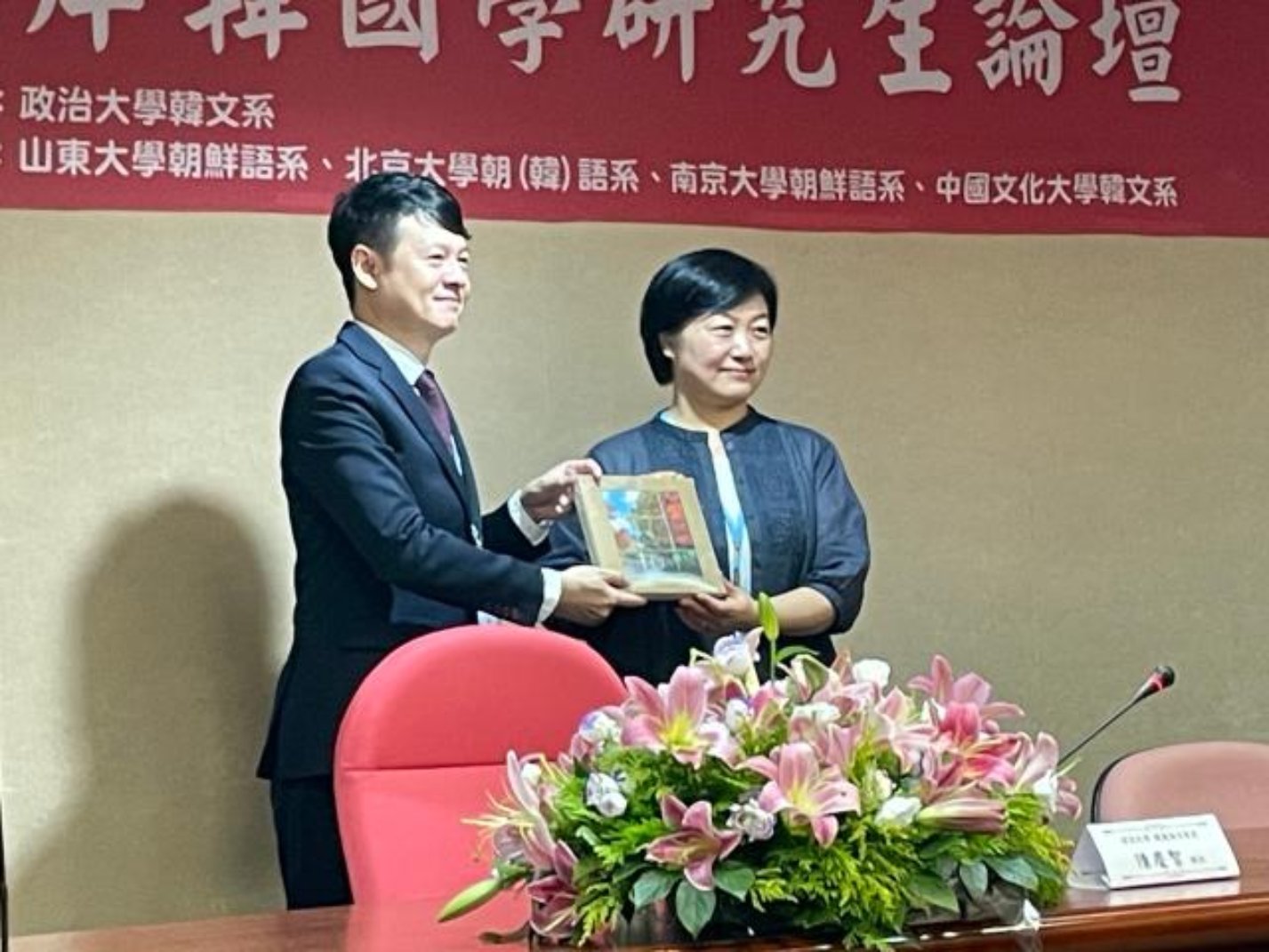
After the opening ceremony, the forum proceeded to the presentation and discussion sessions. Eleven graduate students from the five universities presented their research papers, followed by lively discussions and in-depth exchanges among the participants. Faculty advisors provided commentary and guidance. Session 1, chaired by Professor Niu Linjie from Shandong University, featured presentations by: Sun Zhengsheng (Shandong University) on “Mirror and dream imagination: Emotional restraint and pain expression in ‘Aerial Map · Poem No. 15’”; Zhang Mingjuan (Nanjing University) on “A study on the Chinese pen name of Yoo Gi-seok”; Wang Liyuan (Shandong University) on “Salvation, construction, deconstruction: The An Jung-geun narrative in East Asian theater under the anti-Japanese context”; and Wang Enze (Peking University) on “Shaping the ‘Chinese quarter’: The conception and practice of the Chinese merchant settlement system in modern Korea”. Session 2, chaired by Professor Wang Dan from Peking University, featured presentations by: Ayaguz Muheyati (Peking University) on “A study on the semantic extension mechanism of Korean interstitial concept words from a cognitive linguistic perspective: Focusing on ‘틈’, ‘사이’, and ‘동안’”; Gu Yiyu (National Chengchi University) on “A comparative study of Korean and Chinese expressions of cause and reason: Focusing on the Korean connectors ‘-어서’, ‘-니까’, and ‘-기 때문에’”; and Ma Yuwei (Chinese Culture University) on “A study on teaching Korean Sino-Korean negative prefix words to Chinese-speaking learners: Focusing on ‘무- (無)’ and ‘불/부- (不)’”. Session 3, chaired by Professor Jeong Samak (郑墡谟) from Nanjing University, featured presentations by: Zhu Qinglin (Nanjing University) on “The Chinese experience and worldview of late Goryeo Confucian scholar Yi Saek’”; and Pu Weizhen (National Chengchi University) on “An examination of translation strategies in translating Korean Sijo into Chinese Poetry and Chinese Poetry into Sijo”. Session 4, chaired by Professor Jung Yoon Do (郑润道) from Chinese Culture University, featured presentations by: Chen Yuzhen (Chinese Culture University) on “A comparative study of workplace bullying prevention systems in Taiwan and South Korea”; and Zhou Xiaobei (National Chengchi University) on “Differences in the function of questions in gendered discourse: A case study of the first season of the Korean variety show ‘Single’s Inferno’”.
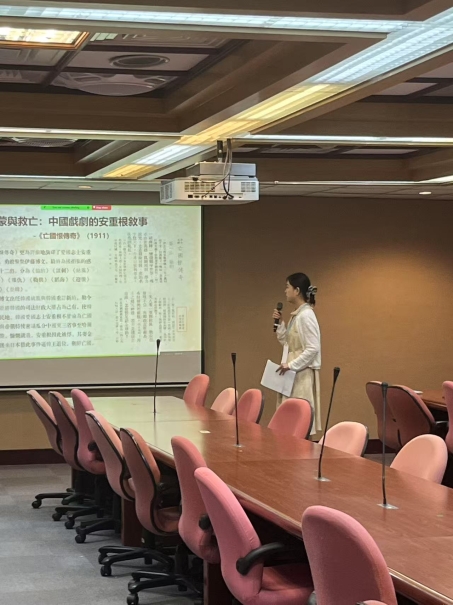
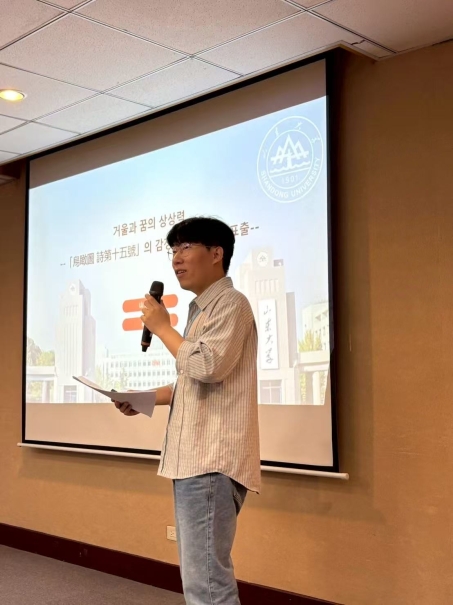
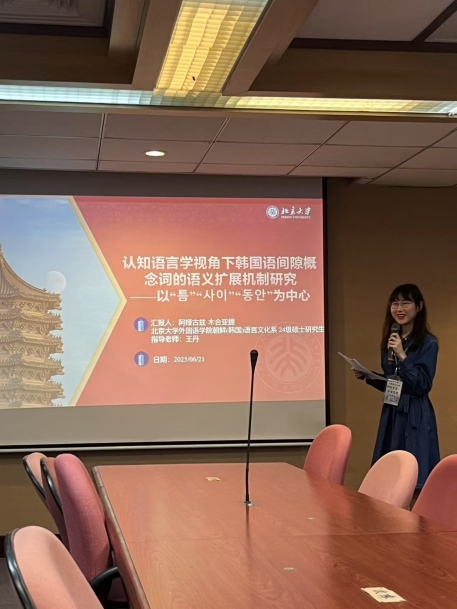
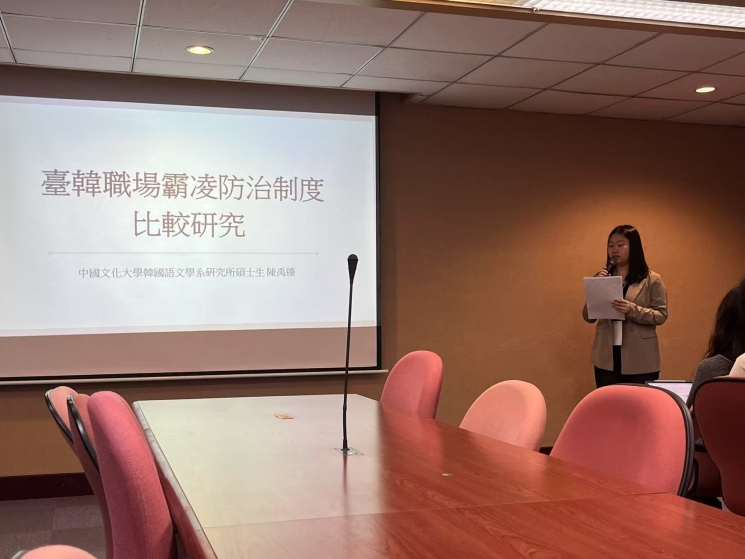
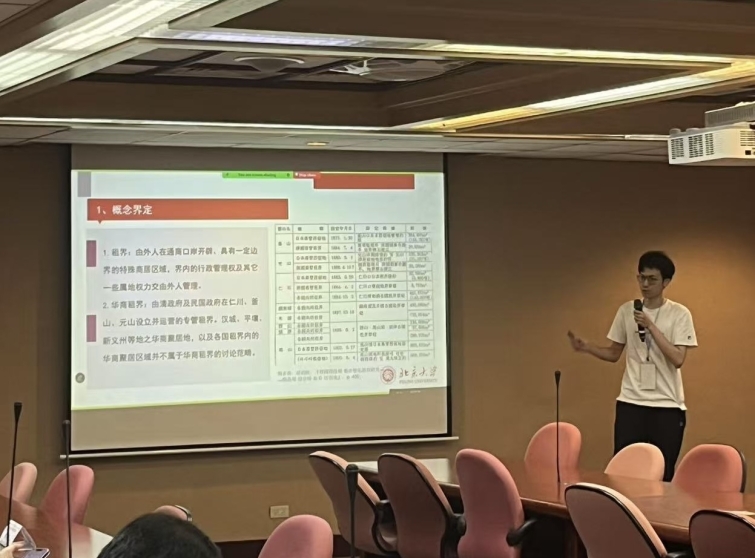
At the closing ceremony, addresses were delivered by Professor Chen Qing-Zhi (National Chengchi University), Professor Niu Linjie (Shandong University), Professor Wang Dan (Peking University), Professor Yin Haiyan and Professor Jeong Samak (Nanjing University), and Professor Jung Yoon Do (Chinese Culture University). Professor Chen Qing-Zhi stated that the excellent presentations fully demonstrated the professional competence and research enthusiasm of the young scholars, and that the newly implemented peer-review system had stimulated deeper academic dialogue and critical thinking. Professor Niu Linjie remarked that the presentations and discussions showcased solid foundational knowledge and keen academic insight. He emphasized that the forum not only provided an opportunity for academic exchange and mutual understanding between teachers and students across the Strait but also vividly reflected the shared cultural bonds. He encouraged students to transform the inspiration gained from the forum into motivation for future research, continually expanding the breadth and depth of Korean Studies. Professor Wang Dan recalled the long-standing continuous exchange and deep friendship in the field of Korean Studies between scholars and students across the Strait and expressed gratitude to the forum organizers. Noting that the forum coincided with the Summer Solstice, she drew an analogy to the balance of Yin and Yang inherent in the solar term, advising students to maintain a balance between theory and practice, and inheritance and innovation in their research, while avoiding extremes and being mindful of potential limitations and unresolved issues. Professors Yin Haiyan and Jeong Samak, participating online, expressed their gratitude and congratulations on the successful hosting of the forum and extended an invitation for participants to attend the 10th Cross-Strait Korean Studies Graduate Student Forum, to be hosted next year by the Department of Korean Language and Literature at Nanjing University. Professor Jung Yoon Do shared his thoughts on Chinese Culture University's first participation in the forum, summarized the characteristics of the research presented by students from both sides of the Strait, and expressed his hope that they would continue to strive for progress through mutual supplementation and exchange.
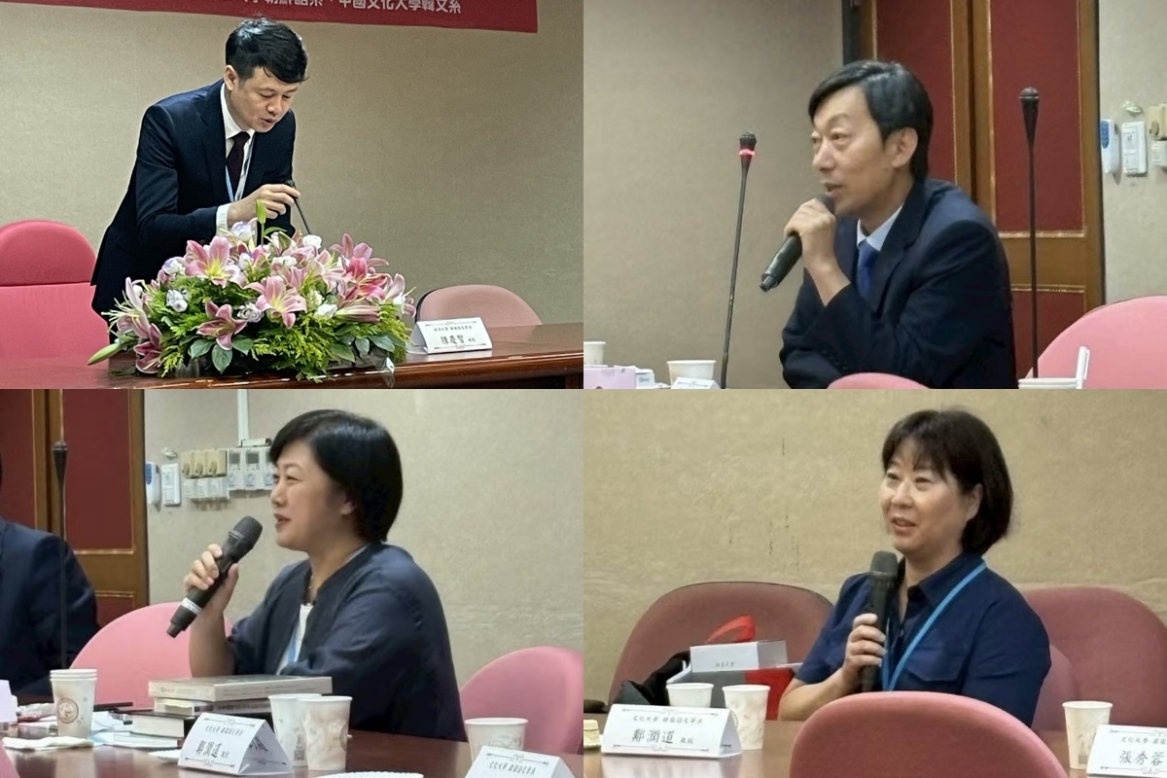
This forum provided a crucial platform for young scholars of Korean Studies across the Strait to exchange ideas, discuss research, and learn from each other. The 10th Cross-Strait Korean Studies Graduate Student Forum will be hosted by the Department of Korean Language and Literature at Nanjing University. It is anticipated that the forum will continue to innovate and persistently promote the exchange, mutual learning, and common development of Korean Studies across the Strait.
Text: Wang Enze
Photos: Department of Korean Language and Literature,
National Chengchi University
